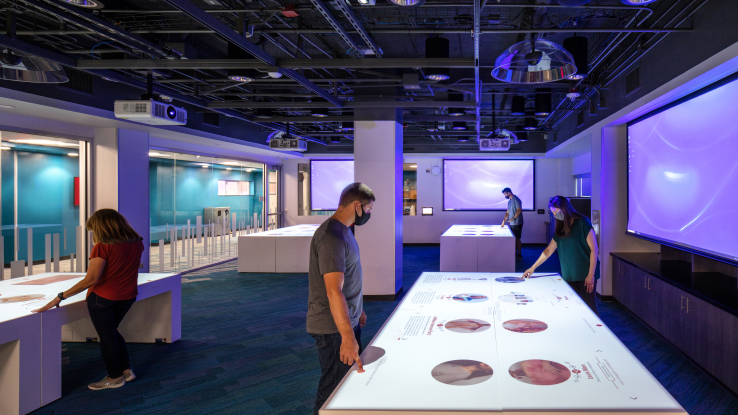
So you wanna be an innovator?

The Libraries’ new Innovation Studio is kicking off its workshop series this semester with an exciting online lineup, including our initial "Innovation 101" workshop on Friday, Sept. 25. The 90-minute workshop introduces different kinds of innovation through case studies and examines some of the creative and critical thinking skills that innovators deploy.
Located in the newly renovated Hill Library, the Innovation Studio is a new type of learning space for the Libraries, featuring interactive exhibits of groundbreaking student and faculty work and offering workshops and events to teach about tools and methods that spark innovation. Eventually the workshop series will take place in Libraries spaces but, because of the campus coronavirus response, all fall 2020 semester workshops have moved online.
Workshops on “future thinking” and “signals of change” follow in October and November (full schedule below), involving the deduction of coming trends and conditions as well as how to anticipate and prepare for them.
If you think innovation happens through special, individual talent or sheer luck, the librarian team that has designed the Innovation Studio workshops would like to differ. They hope to distill the broad idea of innovation into actionable processes and teachable tools.
“The Innovation Studio team recognizes that innovation is an abstract term that can mean different things to different people, and we want to give students and faculty more than just platitudes,” says Tori Culler, Libraries Fellow. “We hope that our unique space and services will inspire students and faculty to tap into their ingenuity, and that they leave each interaction they have with us with a new frame of reference and/or some practical tools to work with.”
The team has built a bank of tools and methods to share with students and faculty borrowed from many key thinkers and organizations working in the innovation space, including vignettes and thought experiments, case studies of innovation that span the local to the global, creative writing exercises, and game-based approaches such as “The Thing from the Future,” “100 Ways Anything Can Be Different in the Future,” and “The Equitable Futures Toolkit.”
“Our working definition of innovation has been ‘A new approach that creates an impact,’” Culler says. “This statement is intentionally value-neutral as we realized early on that a key tenet of our pedagogy needs to involve treating each innovation we encounter with a healthy amount of skepticism. It’s easy to put innovation on a pedestal, but it is also necessary to consider both the positive and the negative impacts of the novel things that we create.”
The fall 2020 schedule of Innovation Studio workshops is as follows:
“Innovation 101”
Friday, Sept. 25, 1:00 p.m.-2:30 p.m.
What is innovation? Can you teach someone to be an innovator? How do we handle the unintended consequences of our innovations? In this workshop, you will explore theseall of the above questions by learning about different types of innovation, discussing local and global case studies of innovation, and brainstorming the innovations of the future. No prior knowledge required. Recommended for anyone interested in developing creative problem solving skills.
“Futures Thinking 101”
Friday, Oct. 16, 1:00 p.m.-2:30 p.m.
What does it mean to be a futurist? What are the benefits and blind spots of “Futures Studies” and “Futures Thinking?” What type of future do you want to help make a reality? In this introductory workshop, you’ll leave with answers to all of these questions and more. You’ll play a game to determine how you tend to approach the future and leave with a toolkit of resources that you can use to start thinking like a futurist in your personal and academic projects. No prior knowledge required. Recommended for anyone who is interested in thinking creatively about the many possible futures for themselves, their discipline, their community, and beyond.
“Signals of Change: Seeing the Future, Today”
Friday, Nov. 6, 1:00 p.m.-2:30 p.m.
This workshop will provide an overview of “Futures Thinking” and how to begin spotting “signals of change.” Signals of change are specific examples of the future in the present. They’re indications that the future might soon become different, and are generally considered to be the raw material of futures thinking. Through hands-on exercises, you’ll walk through some examples, find some signals of your own, and figure out how to apply signal spotting to your personal and academic life. Our “Futures Thinking 101” workshop is a good precursor to check out before taking this one, but not at all required. Come curious and prepare to start thinking like a futurist.
